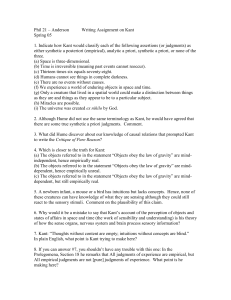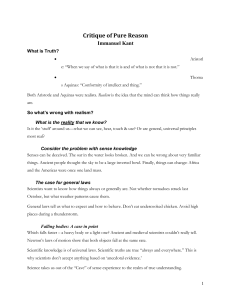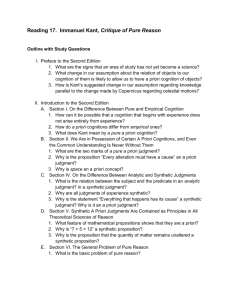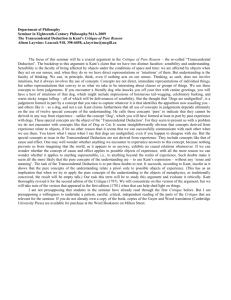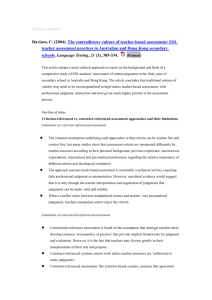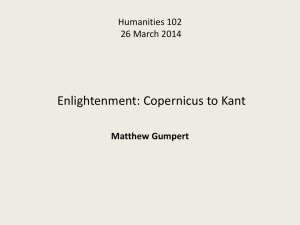Thesis Abstract
advertisement
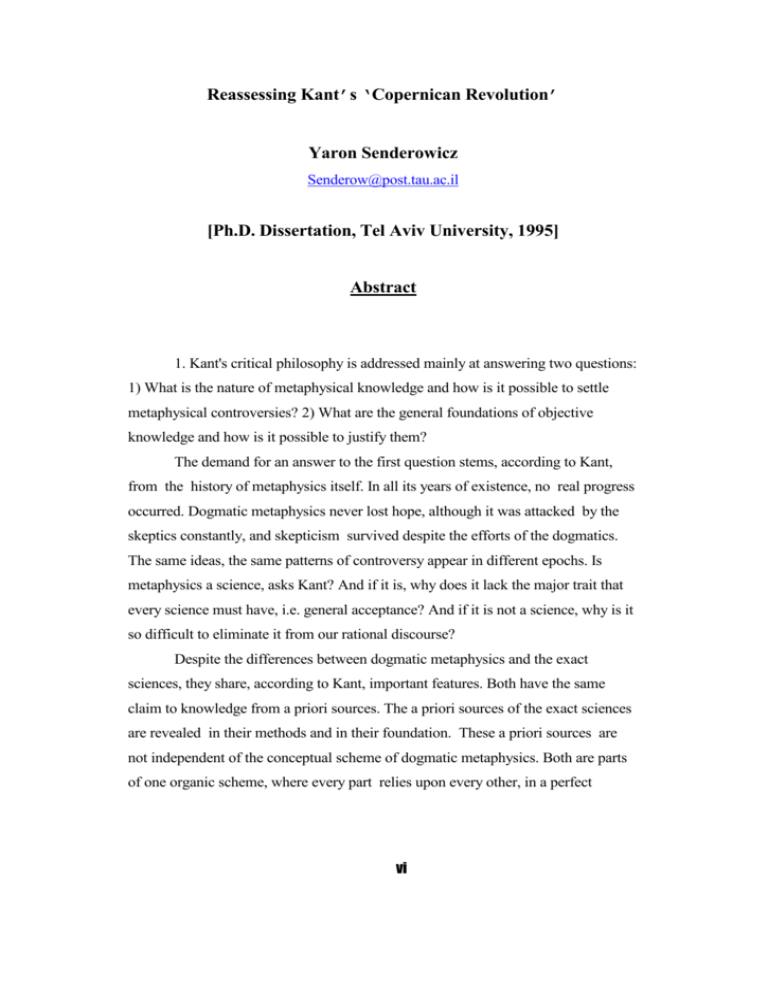
Reassessing Kant’s ‘Copernican Revolution’ Yaron Senderowicz Senderow@post.tau.ac.il [Ph.D. Dissertation, Tel Aviv University, 1995] Abstract 1. Kant's critical philosophy is addressed mainly at answering two questions: 1) What is the nature of metaphysical knowledge and how is it possible to settle metaphysical controversies? 2) What are the general foundations of objective knowledge and how is it possible to justify them? The demand for an answer to the first question stems, according to Kant, from the history of metaphysics itself. In all its years of existence, no real progress occurred. Dogmatic metaphysics never lost hope, although it was attacked by the skeptics constantly, and skepticism survived despite the efforts of the dogmatics. The same ideas, the same patterns of controversy appear in different epochs. Is metaphysics a science, asks Kant? And if it is, why does it lack the major trait that every science must have, i.e. general acceptance? And if it is not a science, why is it so difficult to eliminate it from our rational discourse? Despite the differences between dogmatic metaphysics and the exact sciences, they share, according to Kant, important features. Both have the same claim to knowledge from a priori sources. The a priori sources of the exact sciences are revealed in their methods and in their foundation. These a priori sources are not independent of the conceptual scheme of dogmatic metaphysics. Both are parts of one organic scheme, where every part relies upon every other, in a perfect vi architectonic order. Since all our a priori concepts are correlated with each other and since only part of our a priori knowledge is objectively real, we need one systematic explanation, that will make clear the differences between the scientific status of the non-problematic part of our a priori knowledge and the problematic one, as well as the necessary connections between them. Such an explanation has to demonstrate how an objective science of nature could be based on a priori foundations, assert the conditions that such a science must meet, and explain why the need for metaphysics results necessarily from the nature of our objective knowledge and its foundations. In other words, Kant's two general questions are different components of one general plan. According to Kant, the first significant clue that can help us in achieving this goal is noticing that the claim to knowledge from a priori sources is not the only feature that dogmatic metaphysics and the exact sciences share. One other trait they share is their making use of synthetic a priori judgements. Synthetic judgments are generally defined by him as judgments where the predicate concept is not contained in the subject concept, and analytic judgments as judgments where the predicate concept is already contained in the subject concept. The most important difference between an analytic and a synthetic judgment concerns the ability to expand knowledge. Only synthetic judgments can expand knowledge, and a necessary condition for expanding knowledge is relating concepts to intuitions. This is why only synthetic judgments require intuitions. The role of intuitions within synthetic judgments provides also a criterion that is supposed to enable us to discriminate between the valid part of our a priori knowledge and the problematic one. According to Kant, creatures like us can have intuitions that are only sensual. Only the synthetic judgments of the understanding could be endowed with intuitions of that sort, and therefore only the pure synthetic judgments of the understanding can really enlarge knowledge a-priori. In contrast to that, the synthetic a priori judgments of pure reason lack a corresponding intuition, and this is the main reason why the belief that we can expand knowledge by means vii of them is a mere illusion. The relation between intuitions and the enlarging aspect of synthetic a priori judgments is one of the most complicated themes in Kant's theory, and it involves serious difficulties. In several places Kant presents the need to relate concepts to intuitions as an essential feature of synthetic judgments: "...the categories are not in themselves knowledge, but merely forms of thought for the making of knowledge from given intuitions. For the same reason it follows that no synthetic proposition can be made from pure categories" (B 288-289). In other words, no synthetic judgment is a judgment from mere concepts. Relating a concept to intuitions is also connected to the concept of 'objective reality'. According to Kant, a concept has objective reality only when one is allowed to claim that it can really be applied to intuitions. Hence only judgments that relate concepts to intuitions have objective reality, and it follows therefore that only judgments that have objective reality are synthetic. In other words, when we abstract from intuitions there is no real difference between the categories of the understanding and the ideas of pure reason, with respect to their objective reality. This is why Kant believes that we must relate the categories of the understanding to intuitions in order to gain real knowledge. But here Kant's theory faces a serious problem: If no judgment from mere concepts is synthetic, then how is it possible to characterize the judgments of pure reason that lack a corresponding intuition as synthetic? On the other hand, if no judgment from mere concepts is synthetic, and all a priori judgments are necessary, what is the nature of the necessity that is attached to a judgment that has objective reality? Are we to conclude that it is not possible to claim that a judgment is objectively real only because it is conceptually necessary? As I claim in chapter 7 this is indeed what Kant claims. The fact that no necessity based on conceptual relations alone can justify us in claiming that a concept has objective reality was the main reason why a transcendental deduction was needed. For if it is possible to derive the objective reality of a judgment from viii the conceptual necessity that it expresses, and if there is no significant difference between the categories of the understanding and the ideas of pure reason with respect to their a priori status, there would be no reason to deny the judgments of pure reason their objective reality. But as will be claimed here, the peculiar concept of necessity Kant uses in order to distinguish between the judgments of the understanding and the judgments of pure reason raises also a different problem. As he claims, one has to isolate the pure judgments of the understanding from the empirical ones in order to secure the foundations of knowledge. But if every synthetic judgment must make use of intuitions and if every empirical judgment must make use of pure concepts (as he thinks) what is the exact difference between these two kinds of judgments? What are synthetic a priori judgments? Similar questions arise when Kant's theory of concepts is considered, a theory that is intimately connected with his theory of judgments. According to Kant, concepts and intuitions spring from different faculties of the mind, and they should be carefully differentiated from each other. Concepts are general representations that are subjected to the spontaneity of the mind, while intuitions are singular representations that are related to its receptivity. Concepts are 'functions', "the unity of the act of bringing various representations under one common representation" (A68/B93). Intuitions are immediate relations to an object. Concepts are the form of our knowledge, while intuitions supply its content. Characterizing the difference between concepts and intuitions in this vein implies that all our concepts are subjected to the spontaneity of the mind. But according to Kant, one has to distinguish between empirical concepts and pure concepts in order to secure the a priori foundation of knowledge. And how is it possible to make such a distinction if all concepts are related to the spontaneity of the mind, and if all concepts that have content are necessarily related to intuitions? More than that, it seems that concepts that cannot be ascribed to intuitions, concepts like the ideas of pure reason lack an essential ingredient that is part of the ix concept 'concept' itself. But if they lack that essential ingredient, aren't we forced to conclude that these concepts are not concepts at all? Aren't we forced to eliminate these concepts from our discourse altogether? In other words, how is it possible to combine Kant's two main goals: securing the a priori foundations of objective knowledge and criticizing dogmatic metaphysics without being forced to deprive the former from its a priori necessity and without being forced to acknowledge the later as a senseless part of our rational discourse 1? How is it possible to describe the enlarging aspect of synthetic judgments as necessarily connected to their relation to intuitions, without loosening the distinction between a-priori and a-posteriori judgments, and without depriving the judgments of pure reason from their synthetic status (and with that, the possibility of illuminating their problematic status)? 2. As I will claim in my thesis there is no effective answer to these problems within Kant's explicit theory of concepts and judgments. In the first part I will claim that the first to notice these difficulties were the contributors of the Philosophisches Magazin (1789-1792). The major goal of this Journal founded in 1788 by J.A. Eberhard, a representative of the Wolffian Leibnizian school in Germany, was to fight back Kant's criticism of what he titled 'dogmatic metaphysics' . Since the reasons for his criticism stemmed from his theory of judgments, it was natural for them to try to undermine this theory. Their criticism concentrated on two different issues: A- According to them, when one considers Kant's explicit demarcation 1) It should be stressed that by criticizing the possibility of knowledge from pure reason Kant did not intend to eliminate pure reason. The ideas of pure reason are needed, according to him, as regulative rules with respect to empirical knowledge, and most importantly as postulates within his moral theory. x between the different sorts of judgments, the conclusion must be that there is no real novelty in his theory. There was nothing in Kant's critical philosophy, they claimed, that could not be found in the old school. Synthetic a priori judgments were discussed by logicians long before Kant. They are judgments in which the predicate expresses a concept that is a property of the concept expressed by the subject. In contrast, analytic judgments are judgments in which the predicate expresses the primary essence (or part of it) of the concept of the subject. The principle of all analytic judgments is the law of contradiction. The principle of synthetic judgments is the law of sufficient reason. In the special case of synthetic a-priori judgments, the essence of the subject concept is the sufficient reason for the predicate. This formulation of the distinction analytic\synthetic, is considered by them an improvement upon Kant's definitions which are ambiguous, imprecise and impregnated by a psychological flavor. As I will show, these accusations are well founded, if Kant's explicit demarcation between analytic and synthetic judgments is taken into account. In particular, when one explains a judgment as a relation between concepts, one has to admit the truth of their claim, that synthetic a priori judgments were known before Kant. As will be proved, this claim is founded on the distinction between 'property' [propre] and 'difference' that is present in the Port Royal logic. B- On the other hand, what appears to be Kant's real novelty, the characterization of synthetic judgments as judgments that relate concepts to intuitions, raises, according to them, unsolvable problems . In particular, it cannot be reconciled with the purported certainty and necessity of the judgments of mathematical knowledge. These objections were mainly due to Maass (1789), who was well aware of Kant's second position regarding the analytic\synthetic distinction. The general question that he raised concerns the role of intuitions within synthetic judgments. As Maass notices, the only relevance of intuitions to synthetic judgments is their relevance to the truth conditions of synthetic judgments. But if it xi is for this reason that we need to relate concepts to intuitions within synthetic judgments, then Kant's position leads, claims Maass, to significant difficulties: First, how should we classify a judgment when it is divested from (its) intuitions, a judgment that is merely thought? If the relation to an intuition is accepted as a criterion of synthetic judgments then all the judgments of pure reason must be classified as analytic. The only way to question their truth is to question the truth of all analytic judgments, which is of course unacceptable (1789 : 211). Furthermore, if one accepts this formulation of the distinction between analytic and synthetic judgments, one cannot present the basic question concerning knowledge from pure reason as a question concerning the possibility of knowledge comprised of synthetic a-priori judgments. Second, if by the demand to relate concepts to intuitions within synthetic judgments, Kant means that the grounds for the truth of a judgment lay not in the relations between it's concepts, but in the objects that are distinct from the concepts, objects that can be presented to us only through the receptive faculty of sensibility, the consequence is the loss of the certainty of the synthetic a-priori judgments of mathematics (1789 : 212). Third, it seems that Kant's position is question begging. Maass's argument is the following: if the basic principles, when they are merely thought, are analytic, then -- according to Kant -- they cannot ground synthetic judgments. For as Kant claims, the highest principles that ground synthetic judgments cannot be analytic. On the other hand, if they are synthetic, then transcendental idealism has to establish their truth by relating them to intuitions. But if we do not want to question the truth of synthetic a-priori judgments, we are forced to presuppose, that which demands a proof,i.e., that the truth and the certainty of some general synthetic judgment can really have its ground in the relations between the concepts that are thought in it and the corresponding intuitions. In other words, we are making a xii circular argument. (1789 : 228) 2 Hence, both versions of Kant's distinction are problematic. If one accepts the first, one has to admit that there was nothing new in Kant's formulations, and that no specific problems arise regarding a certain class of synthetic a-priori judgments. If one accepts the second, one faces the danger of undermining the necessity of synthetic a-priori judgments. As I will claim, these difficulties -- that originate in Kant's theory of judgments -- have a considerable effect on all his system and most importantly on the transcendental deduction. As will be shown in the second part, the need to distinguish between pure concepts and principles and empirical concepts and judgments, in order to secure the a priori status of the former and the contingency of the latter, forces Kant to presuppose an ability to represent entities that cannot be reconciled with the idea of the "Copernican Revolution" and with his wish to criticize dogmatic metaphysics. In chapters 9 and 12 I claim that such a commitment is revealed through the inconsistency between the meanings that are ascribed by Kant to the concept "transcendental object". As will be seen, the need to establish the objective reality of the pure judgments of the understanding in the transcendental deduction while preserving the sharp distinction between these judgments and the empirical ones, leads Kant to claim that the object of the pure synthetic judgments is the transcendental object. In that context this object is described as the a priori form of every empirical object. But in different contexts he ascribes to it different and conflicting meanings 3. My claim will be that these inconsistencies are directly 3) It is interesting to note that Maass's claim concerning the existence of such a circle within Kant's theory of synthetic a-priori judgments anticipated Parsons (1983) and Kitcher (1975), who hint at a similar conclusion. xiii connected to Kant's assumption that it is possible to establish the objective reality and the general validity of the categories, within the presuppositions of his theory of judgments, without presupposing anything about empirical rules, an assumption that will be proved in chapter 10 to be wrong. In other words, the inconsistencies in question are directly connected to the inadequacy of Kant's transcendental deduction, an inadequacy that is also revealed (as will be shown in chapter 9) in the specific arguments that are used in both versions of the deduction. The conclusion that follows from these considerations, I will claim, is a rejection of the distinction between necessity and contingency as a distinction stemming from two ontological sources. As will be shown in chapter 12, this conclusion is implied also in the implicit connection between the systematic role that is ascribed to the transcendental object and the regulative role that is ascribed to pure reason in establishing the truth of empirical judgments. In this respect the role of reason as the ability to represent non-sensible objects would have to be understood as constituting the possibility of empirical truth and empirical knowledge, and not only as a regulative role. 3. If this is the real nature of Kant's theory, aren't we forced to conclude that the contributors to the Philosophiches Magazin were right? And in that case how is it possible to explain the fact that their criticism had no significant influence upon their contemporaries? It could be that some of the reasons for that fact were the political implications of Kant's writings. But I believe that there were other and more important ones. Their claim that there was nothing new in Kant's theory was definitely mistaken. The problems and the questions that served as the starting point to his later philosophy were real problems and real questions. The real importance 4) As will be claimed, the changes between the two editions of the Critique of Pure Reason cannot explain this inconsistency. xiv of the controversy between Kant and his contemporary critics, I believe, is due to the fact that it enables us to realize how much he was committed to the old philosophy that he struggled to change. It is true that this commitment had a considerable effect upon his explicit theory. But the real revolutionizing power of his philosophy did not lie in that theory. In a certain sense his revolutionizing insights were digging under the explicit expressions of his thought4. His new ideas raised new problems concerning the possibility of establishing objective knowledge. None of the known solutions to this question could fit them. It was not possible any more to present information received from the senses as a basis for explaining objective knowledge since every perception presupposed conditions that were not sensual 5. But innate ideas were also unacceptable. This was in fact one of the major reasons why a transcendental deduction was needed. For as will be shown in chapter 7, one needs a transcendental deduction mainly because it is not possible to explain the objective reality of concepts only by presenting them as "subjective dispositions of thought implanted in us from the first moment of our existence, and so ordered by our Creator that their employment is in a complete harmony with the laws of nature with which experience proceeds"(B 167) (as Crusius thought according to Kant). Hence, my claim will be that the difficulties that are revealed in Kant's theory are due to the clash between his commitment to the old philosophy and his 5) There is more than a reason to believe that he himself was not totally satisfied with the explicit answer that he gave to the possibility of knowledge in the chapters of the analytic. He continued to struggle with these problems until his death, as is shown in his Opus Postumum. 6) Even ideas of color presuppose, according to Kant, the transcendental unity of apperception. xv discoveries of the inadequacies of the traditional framework. They are the consequences of the remnants of the old conceptions that cannot be reconciled with his new discoveries. A greater change was needed in our concept of rationality in order to make sense of the idea of transcendental idealism. It is true that Kant never tried explicitly to look for a different alternative to the theory he presented in The Critique of Pure Reason. But, as I claim in chapter 13, several hints at a different direction of thought that could be followed in order to defend transcendental idealism appear in Kant's writings. An important turning point can be detected in the Critique of Judgment and in his political writings. In these writings the social, historical and communicative character of reason is revealed in a way that could be relevant to the concept of objectivity he tries to defend. To be sure, judgments of taste are carefully distinguished by Kant from empirical judgments. The first cannot make use of determinate concepts, while the second necessarily make use of such concepts. But, as I claim in chapter 13, an interesting similarity between Kant's description of judgments of taste and the description one should give of empirical judgments within transcendental idealism, can be detected. The need of such an amendment is apparent in Kant's explicit position concerning empirical truth -- which is extremely problematic. According to him, justifying the objective reality of empirical judgments raises no significant problem mainly because he believes that it is always possible to verify the conceptual relation thought in a judgment by appealing to the object of that judgment. But, as I will claim, this implies that the independent object and its independent properties are the ground for the truth of synthetic empirical judgments. And if transcendental idealism is necessarily connected with an explicit denial of the relevance of any property of an object that is independent of our mind to the objectivity of a judgment, such an answer to the question concerning empirical truth can hardly fit it. xvi Here lies, I claim, the similarity between the general structure of judgments of taste and a possible description of empirical judgments. According to Kant, Judgments of taste omit any objective property of an object. They are essentially a priori and subjective. Nevertheless we can make according to Kant a wrong judgment. In other words although judgments of taste are a-priori and subjective the rightness of a judgment of taste does not depend only on the individual subject, and since it omits any objective property it cannot depend on the object either. In order to explain the rightness of such a judgment we must presuppose, according to Kant, a transcendental idea of reason, an indeterminate concept that cannot provide any proof of the correctness of a judgment, but can only ground the hope to settle any conflict between different individual subjects concerning a judgments of taste. As I will show, this regulative idea and the idea of the 'sensus communis' that serves the same function, point to the inner connection between the concept of rightness that is attached to this sort of judgments and the concept of a community 6. In this respect the mind is presented as essentially involving the concept of communication as an irreducible property. No doubt in many contexts Kant presents the ability to communicate a thought as an external criterion for truth. But in this context, I will claim, the external criterion is the only criterion that is available to us. To be sure, the tension between the subjectivity of judgments of taste and the need to presuppose a concept of a community with respect to them cannot be resolved. But Kant was well aware of that tension and he believed that it was impossible for us to eliminate it. As I will show, the same tension dominates his philosophy of history and most importantly his concept of Enlightenment. All this hints, I believe, at a different theory of the mind than the one presented explicitly by him. It is possible that he himself was at least partly aware of 7) Kant is not always consistent in this subject but, as I will show, this conclusion necessarily follows from his position. xvii the analogy between judgments of taste and empirical judgments, as suggested by the introduction to the Critique of Judgment and from other passages. But he never presented it explicitly. Needless to say that if one acknowledges the external criterion of truth as the only criterion available to finite creatures like us, with respect to objective knowledge too, one is forced to acknowledge language as a necessary and ineliminable condition for the possibility of objective knowledge. In other words, explaining objective knowledge necessarily requires an elaborate theory of language. Kant, of course, never developed such a theory. His inconsistent views about language are apparent from the few passages in his writings where this subject is treated. In some of them he claims explicitly that the structure of language is analogous to the conceptual scheme of our a priori concepts. In others he implicitly rejects the relevance of language to his theory of knowledge. As I will claim, these inconsistent statements reflect in a way the same tension between his new discoveries and the remnants of the old philosophy to which he is still committed. In that respect, understanding the role that language and communication should have within transcendental idealism can help us to understand the real nature of Kant's revolution in philosophy. 4. This thesis has three parts. The theme of the first part is the controversy between Kant and the Philosophisches Magazin. Chapter two presents Kant's theory of judgments as well as the ideas of Arnauld and Nicole, Locke, Leibniz and Hume that are relevant to it. In chapters 3,4,5 several aspects of the controversy between Kant and the Philosophisches Magazin and its implications are dealt with. Part two deals with the transcendental deduction and related issues. In chapter 6 I present the general background to the next chapters. In chapter 7 I explain why Kant thinks a transcendental deduction is needed. Chapter 8 is dedicated to the subjective deduction. Chapter 9 presents the actual arguments that are used in both versions of the transcendental deduction, and demonstrates their xviii failure. Chapter 10 explains why a transcendental deduction is impossible. Chapter 11 point to similar problems with respect to the analogies of experience. Chapter 12 demonstrates the implicit connections between the transcendental object, the thingin-itself, reason and language within Kant's system, and explains the relevance of these implicit connections to the question of empirical truth and to the difficulties discovered in the first part. The third part (chapter 13) outlines an alternative intimated from Kant's writings, which could be used in developing a theory of objective knowledge compatible with transcendental idealism. xix
